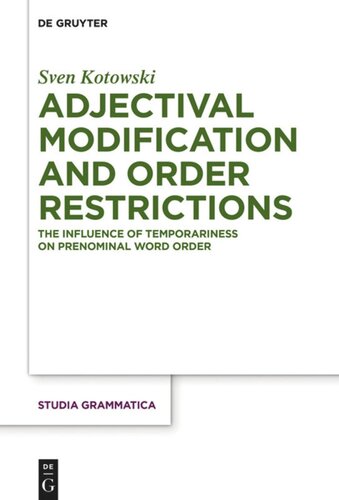

Most ebook files are in PDF format, so you can easily read them using various software such as Foxit Reader or directly on the Google Chrome browser.
Some ebook files are released by publishers in other formats such as .awz, .mobi, .epub, .fb2, etc. You may need to install specific software to read these formats on mobile/PC, such as Calibre.
Please read the tutorial at this link: https://ebookbell.com/faq
We offer FREE conversion to the popular formats you request; however, this may take some time. Therefore, right after payment, please email us, and we will try to provide the service as quickly as possible.
For some exceptional file formats or broken links (if any), please refrain from opening any disputes. Instead, email us first, and we will try to assist within a maximum of 6 hours.
EbookBell Team

5.0
20 reviewsThis monographs investigates into the influence of the individual-/stage-level distinction (IL/SL) on order restrictions of multiple prenominal adjectives (AORs). It rejects the restriction regularly postulated—across different research frameworks—that SL-adjectives are being realized farther from the head noun than IL-adjectives, relegating the alleged constraint to an epiphenomenon of more general principles. While formal-theoretic hypotheses on AORs are formulated and put to the test empirically via a large corpus as well as two rating studies, the book also addresses adjective classification, modification patterns, and the IL-SL-debate in general. The preferred prenominal positions of typical SL-adjectives are argued to follow from their nature as absolute-gradable adjectives as well as from the distinction between object- and kind-modification. The empirical studies corroborate these considerations. The book critically discusses and opposes several well-established hypotheses on AORs, sketches a flexible and parsimonious syntax of adjectival modification, and will be of interest to syntacticians and semanticists working on DP-structure, the IL-SL-debate, and adjectival modification